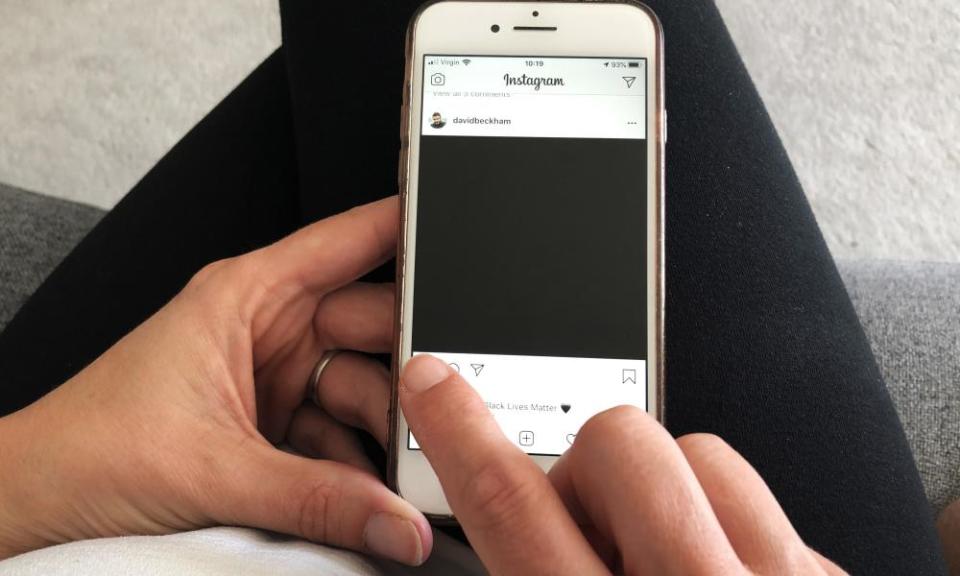As responses to George Floyd's death go, #BlackOutTuesday was embarrassing

On Monday, Donald Trump threatened to deploy the US military on domestic soil, against his own people, and ordered the teargassing of peaceful protesters near the White House so that he could conduct a 17-minute photoshoot holding an upside-down Bible.
At the same time, major cities including New York and Los Angeles declared curfews to stem the protests burning across the country since George Floyd’s death at the hands of Minneapolis police. Police dressed in riot gear clubbed young, unarmed protesters. White militias swinging baseball bats reportedly prowled the streets of a Philadelphia suburb. Hundreds of people were arrested between Atlanta, Las Vegas and Portland.
Related: How to make a difference in the fight against racism and injustice | Arwa Mahdawi
All this to say that it was at this moment of shimmering state violence that members of the music industry decided to organize an Instagram blackout, under the banner “#blackouttuesday”. To make sure we knew who was behind the call, they added another hashtag – #theshowmustbepaused – and asked Instagram users to refrain from social media activity and post a black square on their grids. Not only was this a facile attempt at armchair activism, it actively disrupted the hashtag #blacklivesmatter, which protesters, reporters and activists were using to collate news about police violence against protesters. At exactly the moment when power requires interrogation and urgent reckoning, social media users, celebrities and influencers rallied for silence.
No matter the occasion, social media can always be relied upon to gaze deep into its collective navel. Whereas 24 hours earlier, users had been posting legal information, names of pro bono lawyers and bail funds, filming videos of wanton cruelty and abuses of power, now they were shtum, save for the sanctimonious black squares.
Thanks to the Covid-19 pandemic, many people cannot join protests, due to lockdowns or worries over infecting elderly friends and relatives. It’s understandable that there would be calls for online demonstrations of solidarity with our black brothers and sisters fighting for their lives, but the music industry might have chosen a less useless approach.
Instagram users, for example, could have been spurred to mass-post pages from a 2006 FBI internal intelligence memo – heavily redacted – that detailed the orchestrated infiltration of police and law enforcement agencies by white supremacists. The memo noted white supremacists’ “historical” interest in law enforcement infiltration and warned that not only was there an “active presence” of white supremacists in police departments across the country but that many operated as “ghost skins” – neo-Nazis hiding their affiliations in order to “blend into society and covertly advance white supremacist causes”.
Social media dents our critical perception and lulls us into, at best, the shallows of political engagement
Or social media users might have chosen instead to make viral (a parlance we will hopefully shake after this pandemic) the fact that the Trump White House cancelled grants previously given to programs dedicated to reforming neo-Nazis and dissuading confused white youth from joining radical hate groups, such as Life After Hate. Or the fact that the Department of Homeland Security – whose very job is to identify internal dangers and threats – has shifted away from countering white far-right groups and terrorists since the Trump administration came to power.
For all its distractions and entertainments, the inanity of #blackouttuesday has served as a vital reminder that social media is not a force for change. Instagram and Facebook, in particular, are echo chambers that consistently funnel our energy, righteous rage and political passions into inaction – into bland hashtags and likes. Social media dents our critical perception and lulls us into, at best, the shallows of political engagement– and I say this as a longtime user of social media.
Not so long ago, #JeSuisCharlie became a rallying cry for social media warriors in the wake of the attack on Charlie Hebdo, a French satirical magazine. One can mourn the loss of life in a terrorist attack without identifying oneself with a magazine known for its racist depictions of Muslims, Jews and black people. But social media is not a place for nuance and less so for accountability. In this same way, Bollywood actors who have shilled for skin-lightening products – such as Priyanka Chopra, who advertised a cream called “Light Ultra” – can feel comfortable taking to their pages to bemoan racism. Gal Gadot, the actor who served in the Israel Defense Forces, can hashtag for George Floyd and earn hundreds of thousands of likes.
Social media has long been a silo of hypocrisy, but its thoughtlessness in the face of raging inequality, violence and fear grows with each new crisis. As for the promoters of #blackouttuesday, your silence, as Audre Lorde warned so many years ago, will not protect you.
Fatima Bhutto is a Pakistani author of fiction and nonfiction. Her novel The Runaways comes out in the US this August (Verso Books)

 Yahoo News
Yahoo News 